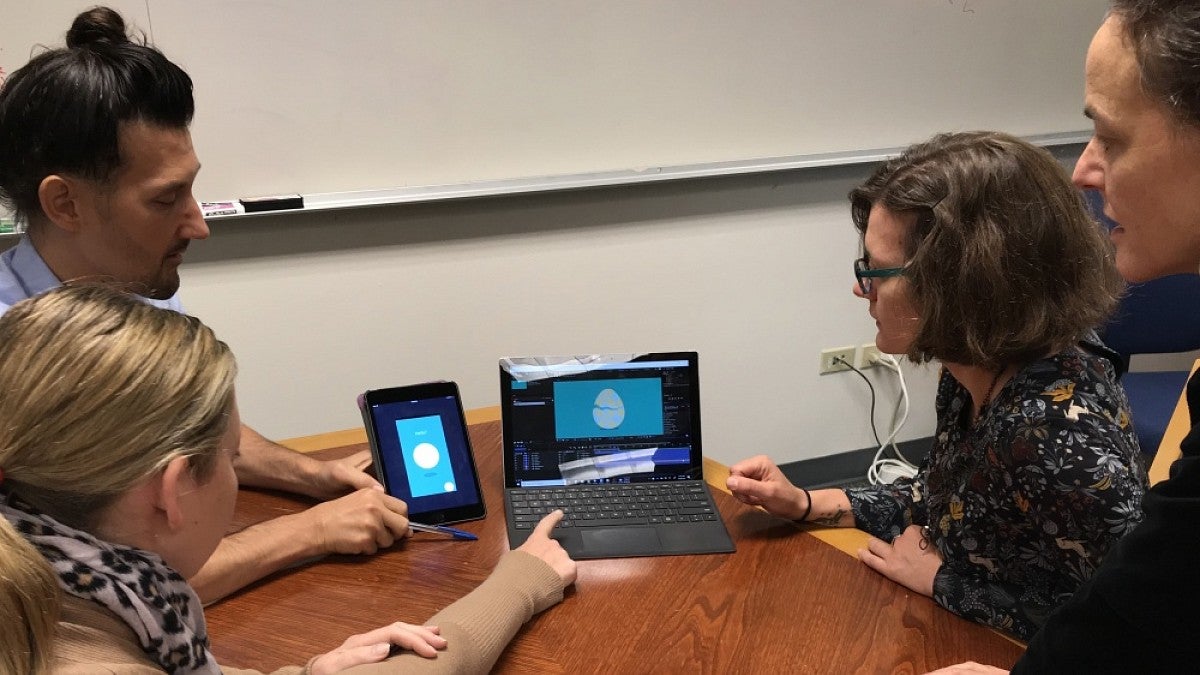A team of four UO researchers will present a new app called Analog U at the upcoming 2018 Mozilla Foundation Festival in London.
The presentation also will explore the ways digital design shapes user behavior in both on and offline spaces as well as advocate for more mindful and conscious engagement with technology. The festival, known as MozFest, runs Oct. 22-26.
The app and its accompanying research were produced by the transdisciplinary team of Julie Sykes, director of the Center for Applied Second Language Studies, associate professor Lisa Freinkel, associate center director Mandy Gettler and research associate Christopher Daradics.
Analog U began as a face-to-face educational method: classroom exercises designed to help explore mindful technology. The activity was led by Frienkel during her tenure as vice provost and dean of the Division of Undergraduate Studies at the UO. Although Freinkel and others advocated for “digital detox” time across campus, it became evident most students and faculty were not really disconnecting from their technology.
“The idea of a digital detox may work for someone in my generation, but for a young person it’s like imagining detoxing from your body — unplugging from your own arms or legs or brain,” Freinkel said. “I decided to approach the issue like the mindfulness educator I am: We need to become mindful not just about our tech but with our tech. In our tech.”
Freinkel reached out to the language center to explore the idea, and the team immediately saw an opportunity to leverage their expertise in linguistics and digital interfaces as a natural research match.
Through the Analog U app, users interact with an artificial intelligence called Robox, a Socrates-type character that leads them through a process of self-discovery and exploration. This self-discovery is divided into 20 areas of inquiry, and users will explore their reactions to liking and unliking behavior, push notifications, scrolling and refreshing, among others.
“Our relationship with technology is complex, because we lead complex lives,” Gettler said. “Our theoretical disposition is that there's a continuity in our experience and that there is no division between our online and offline lives. Our behavior is simply an extension of ourselves. The online/offline divide is a false dichotomy. Analog U inducts the user into mindfulness in online spaces, which are carried over into our offline lives.”
The team based most of its prototyping for Analog U on initial focus groups and existing research. The character of Robox was developed after Daradics caught a glimpse of some drawings by Gettler’s son, who had drawn a little robot.
Prior to their trip to London, the Analog U team will give a presentation to the UO community on Monday, Oct. 22, at the Yamada Language Center in Room 175, McKenzie Hall from 4-5:30 p.m.
The presentation will be interactive, and participants will go through three guided inquiries. First, an exploration of Robox as an extension of using digital technology, answering questions such as, if your phone had a spirit whose mission is it to help you be more conscious, and what would that look like? And how would it function? Second, an exploration of how digital interactions connect to feelings and bodily experiences. And third, an exploration of how digital design structures social experiences.
“Our hope is not to change people’s behavior to an ‘ideal’ model but rather call their attention to be aware of their own choices and interactions with their digital devices,” Sykes said.
MozFest attracts people who love the internet — hackers, performers, students, activists, scientists and designers — to showcase and discuss ideas and advanced technology. This year, the festival is taking a deep dive into key ideas from Mozilla’s first full-length internet health report. Among the key issues are ethical artificial intelligence, net neutrality, data privacy, online freedom and common-sense tech policy.


